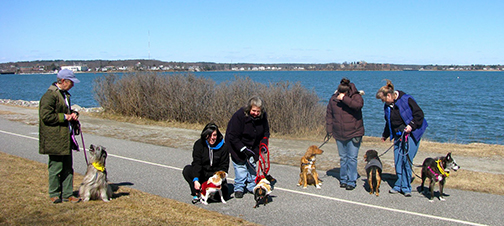Many dogs are afraid of other dogs, men, strangers, children, loud trucks, bikes, scooters, skate boards, odd scents, noises, and many more stimuli. I have spent the last 10 years helping my own dogs and many others live happier, less stressful lives. The first thing you need to realize is that you are not alone! Many many dog owners are feeling just as you are. While we are all at different stages of conditioning our dogs to feel better about certain stimuli, we all have similar fears and stressors. Staying positive is essential! Right now, think about all the behaviors your dog has learned recently. You know your attitude effects your dog, so stay positive! And remember: you are not alone!
Here are a few things to consider:
- Seek out a Certified Trainer who has experience with insecure, anxious and fearful dogs, as they will have a better understanding of what you and your dog are feeling. Find someone who has current testimonials or good references so you know they are using Positive methods.
- Avoid expecting a specific goal, or anxiety will creep in when you fear you may not reach this goal.
- Instead, set simple goals that you and your dog can meet together every moment, every day, week by week and be happy with these small steps.
- Be honest with yourself right now that your dog will never be the “perfect” dog. It is okay, you will still love and protect him or her because he needs you to.
- Think of the advantages of owning a shy or fearful dog:
- He gives you unconditional love because he is worried about others.
- He only needs to be by your side to be content with life.
- His love is without strings attached.
- There are no pressures to earn titles, win ribbons or be the best.
- You will never lose him, as he is too worried about going too far away.
- You will learn more about dog behavior than your neighbor.
- He will not pull you to greet everyone.
 As an example of a positive training attitude, the photo below shows a handsome dog to the far left that is fearful of people, yet he is able to give nice eye contact to his owner. When we began with this boy, we were happy when he could simply offer a quick glance at his owner when strangers were near by. After months of positive conditioning, he is much more comfortable as you can see in this photo.
As an example of a positive training attitude, the photo below shows a handsome dog to the far left that is fearful of people, yet he is able to give nice eye contact to his owner. When we began with this boy, we were happy when he could simply offer a quick glance at his owner when strangers were near by. After months of positive conditioning, he is much more comfortable as you can see in this photo.
I can assure you that his owner was thrilled with each small progression he made at gaining confidence, and was happy to reward him for looking at her even for 1 second when 50 feet away! We slowly progressed, and while he will never be a therapy dog, does that really matter? What sets this owner apart? Her expectations are reasonable, and, when not met, she is still okay with the outcome! Why? Because she knows when her dog does fall back into an old, unwanted behavior it is because we pushed him too far too fast.
So please, set your criteria such that you and your dog can succeed together! Otherwise you will be disappointed and your frustration will simply make your anxious dog even more stressed. Keep your training sessions relaxed, and positive. Don’t push your dog beyond what he or she can handle comfortably, or else the negative experience will just set you both back. Stay patient, stay positive and celebrate all the small successes along the way. You and your dog will be much happier as a result!

